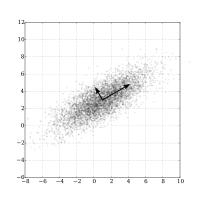
Photo from wikipedia
Brain imaging genetics provides the foundation for further revealing brain disorder, which combines genetic variation with brain structure or functions. Recently, sparse canonical correlation analysis (SCCA) and multimodality analysis have… Click to show full abstract
Brain imaging genetics provides the foundation for further revealing brain disorder, which combines genetic variation with brain structure or functions. Recently, sparse canonical correlation analysis (SCCA) and multimodality analysis have been widely utilized for imaging genetics. However, SCCA is an unsupervised learning method which ignores the diagnostic information related to the disease. Traditional multimodality analysis cannot distinguish the consistent and specific information from different neuroimaging that are correlated to the genotypic variances. In this paper, we propose the Label-Guided Multi-task Sparse Canonical Correlation Analysis (LGMTSCCA) method to identify the informative features from the single nucleotide polymorphisms (SNPs) and brain regions related to the pathogenesis of Alzheimer's disease (AD). Specifically, LGMTSCCA uses label constraint via inducing diagnostic information to guide the imaging genetic correlation learning. Considering multi-modal imaging genetic correlations, we use the weight decomposition strategy to calculate the correlation weights in consistency and specificity with different parameters. We evaluate the effectiveness of the LGMTSCCA on synthetic and real data sets. The experimental results show LGMTSCCA can achieve superior performances than the existing methods, which has more flexible ability for identifying modality-consistent and modality-specific features.
Journal Title: IEEE Transactions on Biomedical Engineering
Year Published: 2022
Link to full text (if available)
Share on Social Media: Sign Up to like & get
recommendations!